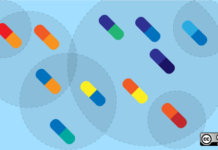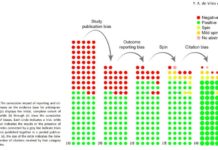The P-Value Problem in Psychiatry
Stanford researcher writes that readers should check the effect size of results instead of looking at the p-value.
How Dissenting Voices are Silenced in Medicine
Researcher criticizes the many ways opposing viewpoints and dissenting voices are squashed in the field of medicine.
Biogen Pushes FDA to Approve Failed Alzheimer’s Drug
A new analysis, published in Lancet Neurology, demonstrates how Biogen is spinning results from two failed trials for a new Alzheimer's drug.
Researchers Set the Record Straight on Controversial Zoloft Study
An issue of Lancet Psychiatry is devoted to clarifying the lack of efficacy for Zoloft (sertraline).
Pervasive Industry Influence in Healthcare Sector Harms Patients
Experts across the globe point to the harms of drug companies’ influence on research, practice, and education in healthcare noting that it compromises patient care.
Statisticians: Current Policies Approve Ineffective Treatments
Current standards for clinical trials rely on statistical methods that allow for ineffective treatments to gain approval.
Withdrawal Symptoms Routinely Confound Findings of Psychiatric Drug Studies
Researchers examine how rapid discontinuation can mimic the relapse of mental health symptoms and confound psychiatric drug studies.
It is Time to Abandon the Candidate-Gene Approach to Depression
The candidate-gene approach to depression goes unsupported and is likely based on bad science, new research finds.
Treatment Guidelines Should Not Be Written by Professional Societies and Insiders
John Ioannidis, a leading expert on research methods, takes a critical look at the way professional societies write treatment guidelines.
Researchers Ask, ‘Why Do Antidepressants Stop Working?’
An international group of researchers, including several with financial ties to manufacturers of antidepressants, explore possible explanations for why long-term users of antidepressants become chronically depressed.
Multiple Researchers Examining the Same Data Find Very Different Results
A new study demonstrates how the choice of statistical techniques when examining data plays a large role in scientific outcomes.
SNRIs Added to the List of Drugs with Potential Withdrawal Symptoms
New research suggests that clinicians should exercise caution prescribing SNRIs as first-line treatment for mood and anxiety disorders.
Two-Thirds of Schizophrenia Patients Do Not Remit on Antipsychotics
A new analysis of antipsychotic treatment of schizophrenia (published in Schizophrenia Bulletin) has found that two-thirds of patients treated this way do not experience symptom remission.
Systematic Review Finds Antidepressant Withdrawal Common and Potentially Long-lasting
Prominent researchers conduct a review of antidepressant withdrawal incidence, duration, and severity. Results lead to call for new clinical guidelines.
Less Than Half of Clinical Trials Comply with Legislation to Accurately Report Results
A new study finds that sponsors of clinical trials in the EU continue to fail at reporting their results as required by recent legislation.
Reanalysis of STAR*D Study Suggests Overestimation of Antidepressant Efficacy
Reanalysis of the original primary outcome measure in the STAR*D study suggests STAR*D findings inflate improvement on antidepressant medication and exclusion criteria in conventional clinical trials results in overestimation of antidepressant efficacy.
New Review of Antipsychotics for Schizophrenia Questions Evidence for Long Term Use
A systematic review of the limited research available on the long-term effects of antipsychotics finds fewer symptoms in those off of the drugs.
Publication Bias Inflates Perceived Efficacy of Depression Treatments, Study Finds
Researchers report the cumulative effects of major biases on the apparent efficacy of antidepressant and psychotherapy treatments.
Most Psychology Research Does Not Generalize to the Individual
A new study claims that quantitative research in psychology is “worryingly imprecise” and that generalizations may be flawed and misleading.
Poor and Foster Care Children More Likely to be Diagnosed and Treated with Psychiatric...
Study details Medicaid-insured birth cohort’s exposure to psychiatric medications and mental health services.
Review of Pediatric Antidepressant Studies Finds Evidence of Benefit Lacking
Review of pediatric antidepressant studies finds the vast majority are negative on primary outcomes and an increased risk for suicidality.
High Rates of Questionable Research Practices Found in Ecology and Evolution
A new study, published online by the Open Science Foundation, suggests that questionable research practices (QRPs) are prevalent in the fields of ecology and evolution.
New Study Concludes that Antidepressants are “Largely Ineffective and Potentially Harmful”
A new study published in Frontiers in Psychiatry concludes that “antidepressants are largely ineffective and potentially harmful.”
New Site Names Companies Who Fail to Report on Clinical Trials
From Pacific Standard: The U.S. government has never penalized anyone for breaking a law that requires institutions to report the results of clinical trials. A...
Transcranial Electrical Stimulation Can’t Directly Alter Brain Patterns, Researchers Find
Due to the thickness of the scalp and skull, transcranial electrical stimulation (TES) is incapable of targeting networks of neurons in the brain.

































